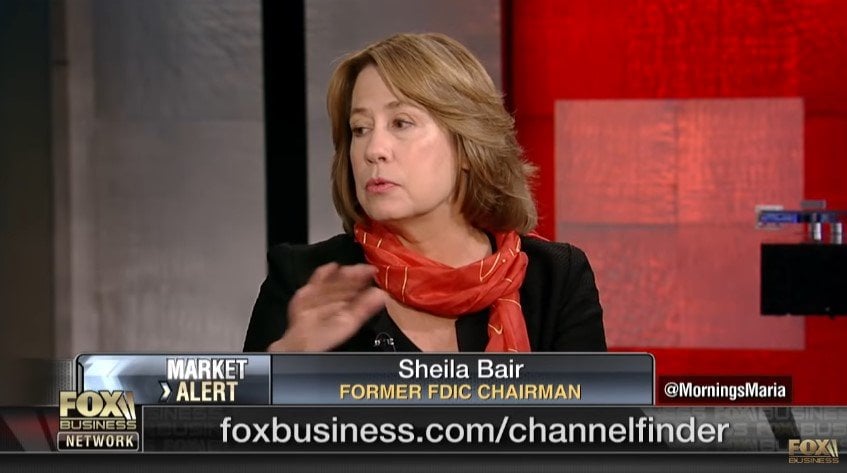Former FDIC Chairman Sheila Bair on bank stress tests, the U.S. economic outlook and the future of cryptocurrency.
Q1 hedge fund letters, conference, scoops etc, Also read Lear Capital: Financial Products You Should Avoid?
Sheila Bair: Fed Needs To Consider A Digital Currency
Transcript
Well it's certainly a lot better than it was prior to the crisis. But I think there are a lot of unknowns. There's a lot of risk I think associated protracted accommodative monetary policy evaluations are very high debt levels are pretty still pretty high by historical standards corporate debt is an all time high. So I think they need to be prepared and I think we should ask him to keep building their capital cushions because we're long in this cycle and we're probably going to be having a downturn in the next couple of years. And so I think it's a very bad idea to be releasing capital. But it sounds like from the press reports that the Fed's going to be permitting them to pay out more and shareholder dividends and they're actually making an earnings which means they would be depleting their capital. So you're not happy with some of this rollback and I am not not at all. I'm very concerned about. I think it's precisely the wrong time these rules. You know the banks barely dry on all of this. They're not perfect but I think at least for the cap rules leave them in place. Let's go through a cycle before we would tinker and they really haven't been tested yet and to start rolling it back. Now I think it's really ill advised. Absolutely. So I guess the taxpayer might wonder what they're supposed to be rooting for with these stress tests because you don't want to own a healthy bag.
But on the other hand if they get a good grade that means they're going to start reducing the cushion they have for a rainy day. Yeah yeah exactly which which I don't get. And you can still be very profitable. I mean you know banking is back. The big banks in particular they could still get a nice healthy dividend without depleting their capital. There's still plenty of room left to keep building incrementally those capital cushions so I don't understand why the Fed would want to do this. Well these are based on press reports we'll see what actually happens but it's from everybody I talked to. That is what's going to happen. Your impression when a lot of new regulations went in on the big banks what we felt in the market was the inability for some of the smaller companies to get a loan that pushed it down to the community banks. What's your view. I mean was that a good move or how's it working out from your point. That's a really good point because if you look at who is doing the lending during the crisis the smaller banks that had much higher capital cushions kept lending through this cycle where the big banks that were much more highly leveraged were pulling back on credit lines not refinancing loans. Yes you probably experienced some of that. So this idea that somehow lower capital is going to increase credit availability is just not right it through the cycle of better capitalized banks will do more lending and that was true with the small banks.
So you know I guess I'm here for women and governance conference today one of the things I've been talking about is for boards just because the Fed says you can doesn't mean you should and you should talk with managers about what happened in the last crisis how many customers lost their credit and how many customers had to be turned down for reifies. We don't want that to happen again. How well prepared are they. There are a lot of small companies that couldn't get loans that just got kicked out. They did. They got 30 days to go find another bank. Exactly right. Which is why they changed some of the rule making smaller banks and lending Degas's if you will get the entire financial system right now. Where do you think is the greatest risk which ends.






